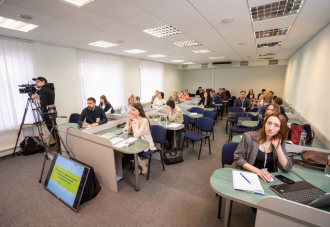Hometown is occupied or under fire, part of the team abroad – these are just a few of the challenges for civil society organizations because of the full-scale war. What they had in common, however, were not only the challenges, but also the understanding that this was no reason to stop. After all, the country needs the help of every citizen and the support of CSOs more than ever to stand up and win.
CSOs were able to simultaneously reorganize their work under wartime conditions and stay true to their mission, whether coordinating volunteers or developing the Ukrainian media space.
To document the experiences that prominent Ukrainian CSOs have had and are still having, we made a series of interviews with the representatives of prominent Ukrainian CSOs entitled “Get Transformed to Survive: Ukrainian CSOs’ Unique Experience in the Full-Scale War”.
From these interviews you can learn how different Ukrainian CSOs are coping with the challenges and threats to their activities in the context of the full-scale invasion.
-
Kherson city community foundation “Zakhyst”
“In the very first days [of the occupation of Kherson] there was no other option but: ‘we must help’,” states Larysa Polska, chairperson of the board of the Charitable Organization Kherson City Community Foundation ‘Zakhyst’. Since the beginning of the full-scale war, this organization has been helping hospitals, families and children, while continuing to work from the occupation for a long time.
- How did the organization work in occupied Kherson and how did it manage to keep its team members safe under these conditions?
- How do we find out about the real needs of CSOs in the occupied and de-occupied territories?
- What is important to take care of for organizations working in the frontline territories?
Watch the interview with Charitable Organization Kherson City Community Foundation ‘Zakhyst’ here.
-
Ukrainian Volunteer Service
After February 24 last year, the Ukrainian Volunteer Service had a comprehensive task: To scale its work quickly when the community was still in a state of shock. What made it possible for the UVS to successfully start coordinating thousands of volunteers across Ukraine?
Watch the second episode of the interview series for more on this, as well as:
- Change in the organization’s communications;
- Establishing cooperation with partners;
- Development of the volunteer network;
- Stabilization of the organization’s work.
Watch the interview with the Ukrainian Volunteer Service here.
-
Educational Human Rights House In Chernihiv
“The first emotional perception of February 24th was as if everything we had been working on for many years had been destroyed,” this is how Serhii Burov, chairman of the Educational Human Rights House in Chernihiv, describes his first impressions of the full-scale invasion that immediately hit the Chernihiv organization
But despite the initial despondency and the organization’s building destroyed by shelling, the Educational Human Rights House in Chernihiv managed to keep its team together and become even more capable.
Watch the third interview in the series on how, in the midst of the full-scale war, you can:
- Refocus the work of the organization;
- Find motivation to work against the odds;
- Become an even more cohesive team.
Watch the interview with Educational Human Rights House in Chernihiv here.
-
Detector Media
“We all have always had a challenging job.” Although it is impossible to prepare for war, the Detector Media NGO team considered the possibility of a full-scale invasion even before it began. What changes have taken place at Detector Media since February 24, 2022, and what advice does Halyna Petrenko, the organization’s director, have for other CSOs? In the fourth interview of the series, she told:
- How Detector Media set up the organization’s representative office abroad;
- What CSOs that are going through certain transformations should pay attention to;
- Principles for choosing a country from which to work in an NGO;
- What helps to remain a stable organization.
Watch the interview with Detector Media NGO here.
This series of interviews was created as part of the Project Ukraine Civil Society Sectoral Support Activity implemented by the Initiative Center to Support Social Action “Ednannia” in partnership with the Ukrainian Center for Independent Political Research (UCIPR) and Centre for Democracy and Rule of Law (CEDEM) with the sincere support of the American people through United States Agency for International Development.



